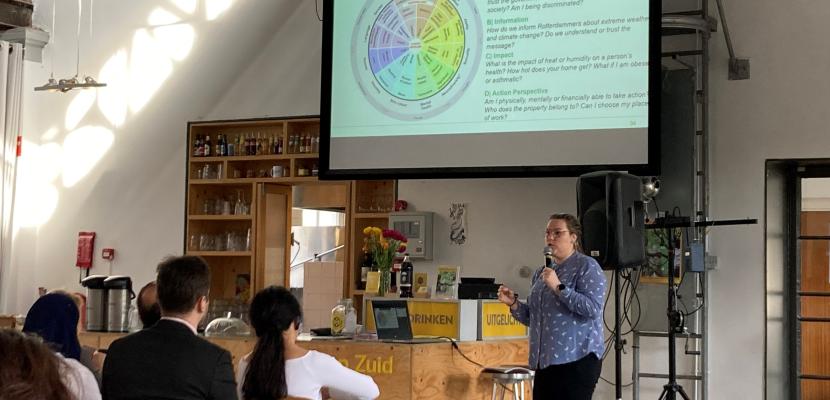
Climate Justice Rotterdam (CJR)

About this good practice
Climate change is a complex issue requiring more than technical solutions. It significantly impacts health and daily life. In Rotterdam, existing inequalities in income, health, housing, environment, ethnicity, and privileges—both between individuals and neighborhoods—will worsen due to climate change, potentially creating new disparities.
The CJR activities are organized by a core team of three civil servants who have permission and funding to dedicate their time to CJR. The main stakeholders of CJR are other civil servants in key positions within the municipality involved in policy-making and projects, as well as external stakeholders working on justice topics. CJR aims to bring the climate justice perspective into policies and projects, ensuring marginalized groups and other residents benefit from better policies and project outcomes.
The Rotterdam Goes for Green policy instrument recognized these threats and started cooperating with CJR within the JustGreen project to leverage their expertise in fighting climate-related inequalities. CJR divides the concept of 'climate justice' into four aspects: social exclusion & discrimination, accessibility of information & communication, impact on well-being, and action perspectives. CJR implements these aspects by creating awareness within the municipality, supporting the intake of social data in technical projects, and gathering insights from marginalized groups to translate back to the municipality.
Expert opinion
Resources needed
The CJR core team in Rotterdam consists of 5 members: 3 civil servants and 2 external experts. Funded by the municipality's Rotterdam Weatherwise and Water Sensitive programs, 1 person works full-time, and 2 work 75% of their time on CJR. The 2024 external budget was approximately €100,000.
Evidence of success
Through awareness sessions and networking, CJR incorporated climate justice themes into local policy frameworks like the Climate Adaptation Program and the Policy Framework for Societal Living. They developed the Climate Justice Wheel to identify blind spots in municipal policies. CJR participates in various projects, including the Water and Climate Plan, the Green and Healthy Neighborhood Approach, and the Climate Citizens Panel, collaborating with over 40 partners.
Potential for learning or transfer
Other cities can gather insights how a CJR like movement within the city organisation can be started to support policy change. By implementing the Theory of Change, CJR identified the activities needed to facilitate change within the city of Rotterdam; by creating awareness, providing support and helping to bring ideas to practise. Furthermore CJR has developed a practical tool: the CJR Climate Justice Wheel that can be used to provide insights about different perspectives and climate justice aspects. It gives the users insight in blind spots in policies and how to incorporate these blind spots in future policies to make them more inclusive for all residents.
For successful use, it is necessary to start collecting the relevant data (geographical, demographical, social), to incorporate all different relevant aspects in just climate policies.

